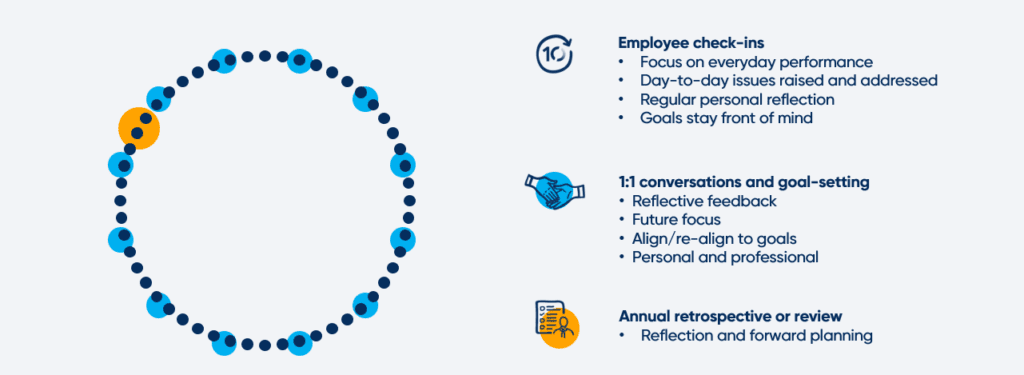Reviews, appraisals, evaluations…Whatever you call them, conversations about employee performance are one of the three foundations of performance management. The only problem is, 95% of managers and 80% of employees feel traditional performance reviews don’t work. That’s why we recommend adopting performance conversations best practice rather than performance appraisals.
What is a performance conversation?
A performance conversation is any 1:1 meeting between a manager and an employee that’s focused on performance. That can be a classic performance review, a 1:1 catch-up, a probation evaluation or any other type of manager/employee meeting.
To ensure performance appraisal best practice, each meeting should be based on honest, two-way, timely feedback.
Performance conversations give managers a better understanding of how they can help their people to improve their own performance and overall contribution. They encourage employees to drive their own progress and ask for help when they need it.
Why traditional performance reviews don’t work
Despite being a mainstay in corporate culture, performance reviews are a huge point of contention. It seems like everyone hates them, and yet they persist. So, do performance reviews work, or are they holding us back?
Performance reviews are based on outdated goals
Traditional performance processes check an employee’s progress just a few times a year. With little to no intermittent feedback for guidance. That’s exactly why performance reviews don’t work.
If formal reviews are an employee’s only major source of critical feedback, it creates a sense of ambiguity. And there’s a high chance of cognitive bias creeping in. That’s because details are missed. A employee’s appraisal is based on subjective recollections not evidence gathered over time. That’s the opposite of performance best practice.
Performance review prep is unnecessarily time-consuming
You might think something that only happens once or twice a year couldn’t be very disruptive. But that’s far from the case. Traditional performance reviews consume hundreds of hours each year for managers and employees. Managers spend time pouring over emails, files, and notes to work out each team member’s performance. Employees assess themselves against outdated goals and reflect on their performance throughout the year with little guidance. And, on top of all that, HR leads the whole thing.
Performance reviews are HR-led, not employee-led
The people responsible and accountable for performance aren’t leading the conversation. Employees look externally when they don’t get professional growth. So managers must be confident in understanding their team’s needs. And find ways to support them to develop new skills.
4 benefits of using conversations rather than reviews
1. Conversations keeps things simple
Things get lost in translation. And for global businesses, it’s important that everyone understands what’s meant. Whether you label 1:1 discussions around performance (review, appraisal, or evaluation), for best practice, they should all be conversations.
2. Conversations better describe how performance meetings should feel
All too often this type of meeting becomes a case of manager dictating to employee. That’s not how effective performance conversations work. Performance-related meetings need to be an open and honest conversation between those involved. Traditional uni-directional communication just doesn’t cut it.
3. Traditional tools and terminology (like appraisals) give performance a bad rep
80% of employees see little benefit to traditional reviews. 95% of managers are unhappy with existing performance tools. Best practice tells us that moving away from traditional language can help freshen up perspectives on what a great performance appraisal can look like.
4. Conversations keep things regular
Zensai encourages employees to focus on their performance each week through the Engage365 check-in. Making small tweaks is a lot easier than huge mindset or process shifts once a quarter. That’s achieved by getting regular feedback from their manager. This is an evidence-based approach to better performance. And something that Marcus Buckingham advocates in both the Wall Street Journal and Harvard Business Review.
What are the negatives of performance conversations?
Honestly, there aren’t any. Well, if you’re coasting and trying to stay under the radar, then you won’t like it. But if you’re engaged and wanting to succeed, then performance conversations are for you!
Flexibility and great communication are key success factors for businesses. And performance conversations underpin this. But manager mindset matters. They are one of the biggest influences on an employee’s success. They must themselves by open-minded to change and work towards a continuous, best practice agile approach to performance.
9 types of performance conversation
Scheduled performance conversations
- Employee check-ins focus on everyday performance. Day-to-day issues are raised and addressed. Regular personal reflection is encouraged. And goals stay front of mind. Managers give timely feedback to steer and recognize progress.
- 1:1 conversations are a time to reflective on feedback themes and focus on the future. Goals can be aligned or re-aligned. And personal and professional development is discussed.
- Goal-setting conversations are big-picture focused. They may be a team meeting with individual actions to set OKRs afterwards. Either way, these are about setting your stake in the ground and saying how you will align your contribution to team and business success.
- Retrospectives or reviews are for reflection and forward planning, rather than information gathering and evaluating past performance.
Ad hoc performance conversations
- Underperformance reflects on you. And need addressing quickly. But problems with underachievement aren’t always easy to spot. After all, we all have our bad weeks every now and then. An employee’s productivity might fluctuate a little from week to week. That doesn’t always mean there’s some larger problem at work.
- Overperformance can be a dream come true. Employees finish projects ahead of deadlines, and offer a ton of discretionary effort. Other times, it can be a sign of someone struggling to maintain healthy boundaries.
- Project reviews happen while a project is running to check everything’s going to plan. They should also be combined with a post-completion retrospective to develop new learnings for future projects.
- Ad hoc 1:1 conversations tend to be request my employees when they aren’t clear on a way forward. Or if they want to discuss a personal issue that may affect their performance at work. Either way, take this as a good sign. Your people trust you enough to have an open and honest conversation with you. Before an issue escalates or you need to have a difficult conversation.
- Pay review conversations are important because financial compensation matters. And if someone has proven themselves an essential part of your team, it’s only fair to adjust their compensation accordingly.
How often should you have conversations about performance
The best cadence for performance conversations looks like this:
- Weekly employee check-ins supported by timely manager feedback on those updates
- Monthly 1:1s
- Quarterly goal-setting (replacing or extending that month’s 1:1)
- Annual retrospectives or reviews
- Ad-hoc conversations as and when required
Obstacles. Arguments. Exemplary performance. If you’re not checking in with your people, these are the things you’ll miss.

Weekly check-ins underpin every single performance conversation you’ll have
Employees are 2.7 times more engaged when they get feedback weekly. This is because effective performance management should facilitate frequent, meaningful manager-employee conversations. Which is basically Gallup’s way of saying regular, two-way feedback is critical to performance appraisal best practice.
A weekly check-in is a quick but structured way to give your manager a snapshot of how your week has gone. It focuses on your day-to-day experiences and progress, but doesn’t replace face-to-face discussion. Instead, your formal 1:1 meetings are more effective because they’re not bogged down in the daily details.
As well as that, it’s about taking time to reflect and record items for your own personal development. It’s an opportunity to build your show-reel of achievements, rather than a list of everything you’ve ever done.
How to prepare for a performance conversation
Preparation best practice for managers
Review preparation is key and shows your employee that you respect them. Having constant one-to-ones isn’t feasible. But you can’t go into a performance review without preparing. That’s not best practice! A lot can happen in the time between reviews. So stay on top of progress with regular check-ins.
Whilst a performance conversation takes an hour or less, great managers do the legwork throughout the year to make these sessions effective. Outlined below are the 8 ways to achieve performance conversation best practice.
- Ask the right questions
- Focus on regular feedback
- Automate where possible
- Build a collaborative agenda
- Look forward more than back
- Embrace continuous performance
- Set goals and review often
- Use 360 feedback
Preparation best practice for employees
Even with preparation, actually sitting down for a performance review can still be pretty daunting. Take a breath and keep a cool head. Bear in mind that the review is to help you improve your ongoing performance. Not to rake you over the coals. And a good manager fully understands this.
The key things to do, and covered in more detail in this blog, are:
- Don’t wait until your next performance review to ask for feedback, a pay rise, or raise an issue
- Try to document feedback and events as they occur
- Consider your personal development goals
- Understand your own strengths and weaknesses
Be honest with yourself. If you’ve been underachieving, do some soul searching to get to the bottom if it. Are you having a tough time outside of work? Have you reached the ceiling at this company? Or have you outgrown this role? Equally, if you’ve been overachieving, has it been at the detriment to your own wellbeing? Or are you not being stretched. Be prepared to discuss your career aspirations and take the lead on your development.
What questions should I ask?
Questions that managers can ask in a performance conversation
It depends. Sorry! Performance conversation questions will be significantly different if you’re using weekly check-ins verses just annual reviews. Weekly check-ins underpin performance appraisal best practice.
Keep in mind that questions should have a purpose. Woolly questioning wastes everyone’s time. Have a clear outcome in mind before you dive in. And do your homework. Remember, review preparation is key and shows your employee that you respect them.
Here’s a handy list to get your started:
- Questions to ask in a 1:1 meeting
- Questions to ask in a quarterly review
- Questions to ask in a project review
- Questions to ask in a meeting about underachievement
- Questions to ask in a meeting about overachievement
- Questions to ask in a pay review meeting
Questions that employees can ask in a performance conversation
This is your time to shine. This shouldn’t feel like an interrogation. Go into the performance conversation with an open mind and a bank of evidence to back up your performance.
- Remember the importance of active listening
- Don’t focus too much on one aspect of feedback
- Try not to get defensive
- Be honest about problems affecting performance
- Work with your manager to create an aligned understanding
- Find practical ways to apply feedback
Conversations are just one piece of the performance puzzle
Performance conversations exist to help employees grow. They encourage employees to drive their own progress and ask for help when they need it. With the support and guidance of their manager.
But progress can only be achieved with clear goals and expectations about how success is defined. We cover how goal-setting as part of performance management here.









